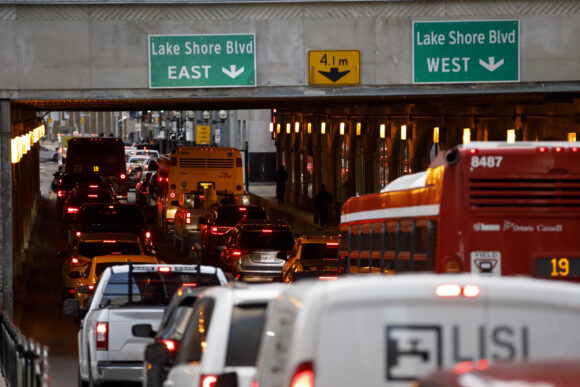Traffic is so bad in Canada’s financial capital that a majority of Toronto residents are prepared to endure around-the-clock construction to improve the situation sooner, according to new polling data.
A survey commissioned by the Toronto Region Board of Trade found that 64% of residents are reluctant to travel to work because of traffic congestion, a dismal statistic that’s harming efforts by banks and other large employers to get workers to come to the office more often.
This reluctance to tackle the commute “can lead to higher absenteeism rates and a decrease in overall workforce participation,” the business organization said in a statement, noting that unpredictable journey times are a huge concern for stressed-out commuters.
“Major employers in the downtown core — a lot of the banks and the big business consulting firms and so on — would very much like to have their employees in the office at least three days a week, potentially four and beyond,” Giles Gherson, chief executive officer of the board of trade, said of his conversations with the city’s business leaders.
“But what’s held them back — because they want to keep their employees, obviously — is they’re very well aware of the fact that their employees are saying: ‘My commute has become intolerable.'”
Toronto was ranked the worst city in North America last year in a traffic index rating published by location technology company TomTom, which determined it took 28 minutes on average to travel 6 miles in the city.
The board of trade’s survey found that 86% of respondents believe there’s a traffic “crisis” in the region. The online poll of 1,000 residents who live in the Toronto region was conducted over a one-week period in June by public opinion firm Ipsos.
Almost three-quarters of respondents said they would support 24-hour road construction if it meant clearing up Toronto’s streets faster. City hall has been working on strategies to accelerate repair work to the Gardiner Expressway, a major thoroughfare for drivers that has been plagued by significant construction delays, but there’s still no solid plan to do so.
Speeding up construction would help, Gherson said, as would faster approvals for work and a more coordinated planning process. Toronto’s “underbuilt and under-resourced transit system” is also forcing commuters into their cars and contributing to its traffic woes, he added. Construction of a new subway line has also closed major downtown intersections, with no firm timeline on when redirected transit vehicles, cars and pedestrians will flow through those arteries again.
Empty Offices
Office employees account for almost 70% of Toronto’s 600,000 downtown workers, according to figures from the city, which is home to the headquarters of Canada’s five largest banks as well as major insurance companies and consulting firms. But efforts to get those financial workers back into the city’s office towers have been shaky, with many indicators suggesting the financial core is still operating well below its pre-pandemic capacity.
Average weekday foot traffic in the Toronto’s office towers in June was still only 67% of what it was before the Covid-19 lockdowns, according to an index maintained by the Strategic Regional Research Alliance, a project supported by a group of downtown business improvement associations.
While that has been steadily trending upward, some days remain persistently slow, with Fridays averaging just 36% of pre-pandemic occupancy levels.
And Toronto’s downtown office vacancy rate was 18.1% in the second quarter of the year, according to a report published earlier this month by real estate consultant CBRE, the highest level since the early 1990s.
Photograph: Evening traffic in the financial district in Toronto. Photo credit: Cole Burston/Bloomberg.
Was this article valuable?
Here are more articles you may enjoy.



 Florida Insurance Costs 14.5% Lower Than Without Reforms, Report Finds
Florida Insurance Costs 14.5% Lower Than Without Reforms, Report Finds  ‘Structural Shift’ Occurring in California Surplus Lines
‘Structural Shift’ Occurring in California Surplus Lines  The $10 Trillion Fight: Modeling a US-China War Over Taiwan
The $10 Trillion Fight: Modeling a US-China War Over Taiwan  AIG Underwriting Income Up 48% in Q4 on North America Commercial
AIG Underwriting Income Up 48% in Q4 on North America Commercial 

